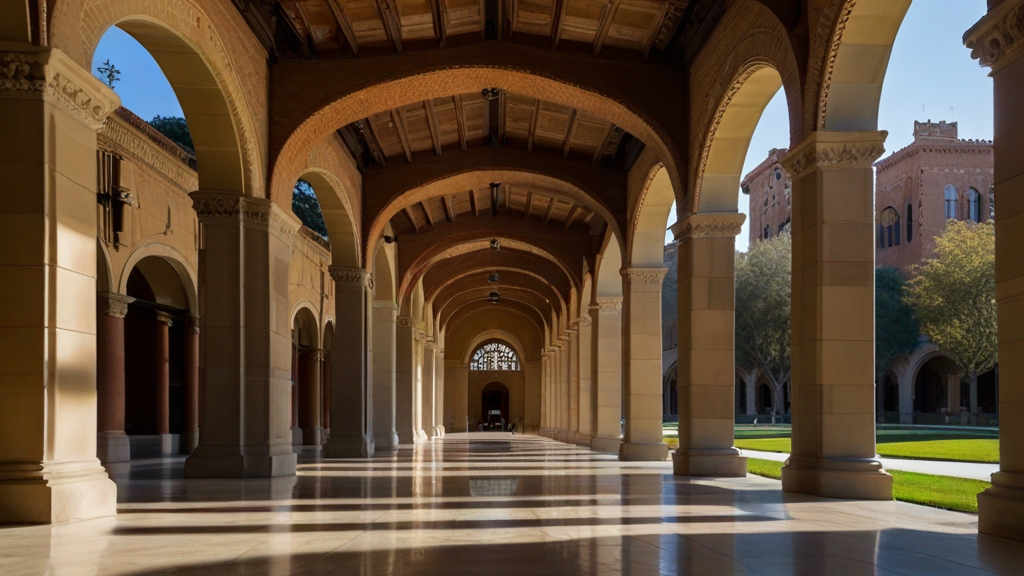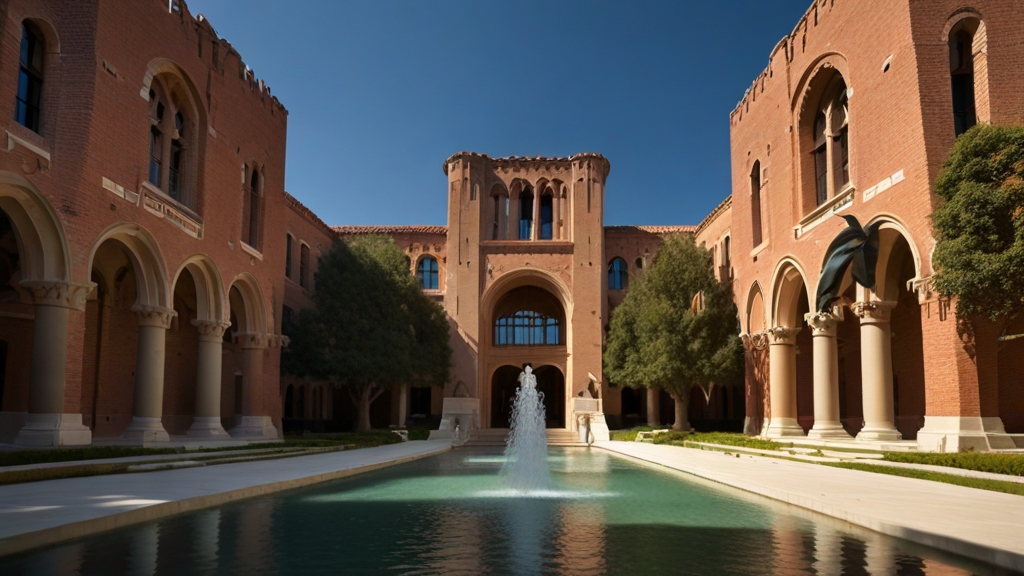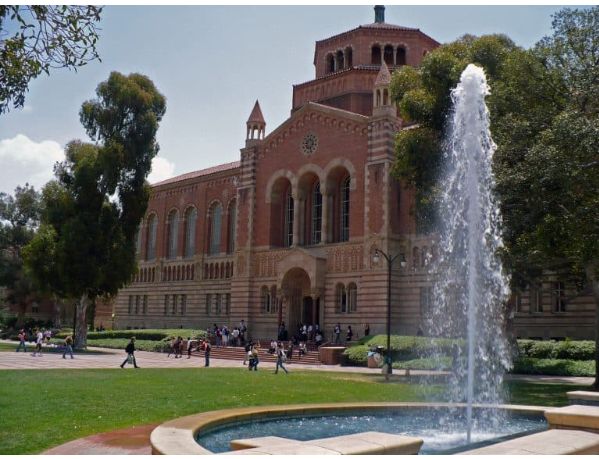
The University of California, Los Angeles (UCLA) stands as a beacon of academic excellence, innovation, and cultural diversity in the heart of Los Angeles. Established in 1919, UCLA has grown into one of the world's most renowned public research universities, consistently ranked among the top institutions globally.
Campus and Facilities:
The University of California, Los Angeles (UCLA) campus boasts a sprawling 419-acre expanse nestled in the vibrant Westwood neighborhood of Los Angeles. Renowned for its blend of historic landmarks and cutting-edge facilities, UCLA's campus provides an enriching environment for academic pursuits and personal growth.
1.Historic Landmarks:
At the heart of UCLA's campus lies Royce Hall, an iconic Romanesque Revival building dating back to 1929. This majestic structure serves as a symbol of the university's academic heritage and houses classrooms, administrative offices, and performance spaces. Nearby, Powell Library stands as a beacon of scholarship, offering extensive collections and study spaces for students.
2.Modern Facilities:
UCLA's commitment to innovation is evident in its state-of-the-art facilities designed to support teaching, research, and collaboration across disciplines. The campus features cutting-edge research centers, laboratories, and studios equipped with the latest technology and equipment. Additionally, UCLA provides ample resources for student wellness, including fitness centers, counseling services, and health clinics.
3.Residential Life:
UCLA offers a diverse range of housing options to accommodate its vibrant student population. From traditional residence halls to apartment-style living, students have access to comfortable and convenient living spaces within close proximity to academic buildings and campus amenities. Residential communities foster a sense of belonging and provide opportunities for social interaction and personal development.
4.Cultural and Recreational Spaces:
UCLA's campus is dotted with cultural venues and recreational facilities that cater to diverse interests and pursuits. The Fowler Museum showcases art and artifacts from around the world, while the Hammer Museum features contemporary exhibitions and programs. Outdoor spaces such as the Mildred E. Mathias Botanical Garden and the Franklin D. Murphy Sculpture Garden offer tranquil settings for relaxation and reflection.
5.Sustainability Initiatives:
Committed to environmental stewardship, UCLA has implemented numerous sustainability initiatives to reduce its carbon footprint and promote eco-friendly practices. The campus features LEED-certified buildings, solar panels, electric vehicle charging stations, and water conservation measures. UCLA's Sustainable LA Grand Challenge aims to tackle global sustainability issues through interdisciplinary research and community engagement.
6.Transportation and Accessibility:
UCLA prioritizes accessibility and provides a variety of transportation options for students, faculty, and staff. The campus is served by public transit, including bus lines and a dedicated UCLA BruinBus system. Additionally, bike lanes and pedestrian pathways promote alternative modes of transportation, contributing to a greener and more sustainable campus environment.
In summary, the University of California, Los Angeles (UCLA) campus offers a dynamic and inclusive setting characterized by a rich blend of history, innovation, and natural beauty. With its impressive array of academic, cultural, and recreational facilities, UCLA provides a vibrant and supportive community where students can thrive and excel in their academic and personal endeavors.

Academic Excellence:
Academic excellence at the University of California, Los Angeles (UCLA) is fostered through a combination of rigorous coursework, distinguished faculty, innovative research opportunities, and comprehensive support services. Here's a detailed overview of how academic achievement is cultivated at UCLA:
1. Challenging Curriculum:
UCLA offers a wide range of undergraduate majors, graduate programs, and professional degrees across various disciplines. The curriculum is designed to challenge students intellectually, encouraging critical thinking, problem-solving, and interdisciplinary collaboration. Classes are taught by renowned faculty members who are experts in their fields, ensuring a high-quality educational experience.
2. Distinguished Faculty:
UCLA's faculty comprises leading scholars, researchers, and practitioners who are dedicated to both teaching and research. Many faculty members are recipients of prestigious awards, including Nobel Prizes, Pulitzer Prizes, and National Medals of Science, contributing to a rich academic environment. They are accessible to students for mentorship, guidance, and collaboration on research projects.
3. Research Opportunities:
As a top-tier research university, UCLA provides abundant opportunities for students to engage in cutting-edge research across disciplines. Undergraduate students can participate in faculty-led research projects, internships, and independent studies, gaining valuable hands-on experience and contributing to advancements in their respective fields. Graduate students have access to state-of-the-art laboratories, research centers, and funding opportunities to pursue their scholarly interests.
4. Academic Support Services:
UCLA offers comprehensive academic support services to ensure student success. This includes academic advising, tutoring, writing centers, and study skills workshops to help students excel in their coursework. The campus also provides resources for career development, internship placement, and graduate school preparation, empowering students to achieve their academic and professional goals.
5. Innovative Learning Spaces:
UCLA's campus features modern classrooms, laboratories, and collaborative spaces equipped with advanced technology and resources to facilitate effective teaching and learning. The UCLA Library system, one of the largest academic research libraries in the United States, offers extensive collections, digital resources, and specialized services to support student research and scholarship.
6. Holistic Education:
Beyond academics, UCLA emphasizes the importance of holistic education, including leadership development, community engagement, and cultural enrichment. Students have access to a wide range of extracurricular activities, student organizations, and cultural events that complement their academic pursuits and foster personal growth.
Overall, academic excellence at UCLA is achieved through a combination of rigorous academics, world-class faculty, hands-on research opportunities, comprehensive support services, and a vibrant campus community dedicated to scholarship, innovation, and learning.
Cultural Diversity and Inclusivity:
Diversity and inclusivity are fundamental values at the University of California, Los Angeles (UCLA), shaping every aspect of campus life and fostering a vibrant and inclusive community. Here's a detailed overview of how diversity and inclusivity are promoted at UCLA:
1. Diverse Student Body:
UCLA attracts students from diverse backgrounds, cultures, and identities, creating a rich tapestry of perspectives and experiences on campus. The student population represents a wide range of ethnicities, nationalities, socioeconomic backgrounds, and identities, contributing to a dynamic and multicultural learning environment.
2. Cultural Centers and Programs:
UCLA is home to numerous cultural centers and programs that celebrate diversity and promote cultural understanding and awareness. These include the Afrikan Student Union, Asian American Studies Center, Chicano Studies Research Center, LGBT Campus Resource Center, and more. These centers offer resources, support services, educational programs, and community events that empower students to explore and affirm their identities and heritage.
3. Inclusive Policies and Practices:
UCLA is committed to creating an inclusive and equitable campus environment through its policies, practices, and initiatives. The university actively promotes diversity in recruitment, admissions, hiring, and retention of students, faculty, and staff. Affirmative action policies and holistic admissions processes aim to ensure access and opportunity for historically underrepresented groups.
4. Diversity Education and Training:
UCLA offers diversity education and training programs to promote cultural competency, equity, and social justice among students, faculty, and staff. These programs include workshops, seminars, and dialogue sessions on topics such as unconscious bias, intercultural communication, and allyship. The Diversity, Equity, and Inclusion Certificate Program provides students with the opportunity to deepen their understanding of diversity issues and develop leadership skills in promoting inclusivity.
5. Community Engagement and Outreach:
UCLA actively engages with local communities and partners to address social justice issues and promote equity and inclusion beyond campus boundaries. Community service programs, volunteer opportunities, and civic engagement initiatives allow students to make meaningful contributions to society and address pressing social challenges.
6. Support Services and Resources:
UCLA provides comprehensive support services and resources to ensure the success and well-being of all students, including those from underrepresented backgrounds. This includes academic advising, mentorship programs, counseling services, financial aid, and student organizations tailored to the needs of diverse student populations.
7. Celebration of Diversity:
Throughout the year, UCLA hosts numerous events, festivals, and cultural celebrations that highlight the diversity of its community. These events, such as International Education Week, Black History Month, Asian Pacific Islander Heritage Month, and Pride Week, provide opportunities for cross-cultural exchange, dialogue, and celebration.
In conclusion, diversity and inclusivity are integral to the fabric of UCLA, shaping the university's culture, identity, and mission. Through its commitment to fostering a welcoming and supportive environment for all individuals, UCLA continues to uphold its values of equity, diversity, and inclusion, preparing students to thrive in a diverse and interconnected world.

Global Impact:
The global impact of the University of California, Los Angeles (UCLA) is evident across various dimensions, including research contributions, international collaborations, alumni achievements, and cultural influence. Here's a detailed overview of how UCLA's global influence manifests:
1. Research and Innovation:
UCLA is a powerhouse of research and innovation, producing groundbreaking discoveries and advancements that have global implications. From pioneering medical treatments and technologies to cutting-edge developments in science, engineering, and humanities, UCLA's research endeavors address pressing global challenges and shape the course of knowledge and innovation.
2. International Collaborations:
UCLA actively engages in collaborative partnerships and initiatives with institutions, organizations, and governments worldwide. These collaborations facilitate knowledge exchange, joint research projects, student exchanges, and academic programs that transcend borders and contribute to global understanding and cooperation.
3. Alumni Achievements:
UCLA boasts a vast network of alumni who have made significant contributions to various fields and industries around the world. UCLA alumni include Nobel laureates, Pulitzer Prize winners, CEOs, politicians, artists, and thought leaders who leverage their education and experiences to make a positive impact globally.
4. Cultural Influence:
UCLA's cultural influence extends beyond academia, encompassing the arts, entertainment, media, and popular culture. The university's alumni and faculty have played pivotal roles in shaping cultural movements, producing influential works of literature, film, music, and art that resonate with audiences worldwide.
5. Global Education and Exchange:
UCLA's commitment to global education is reflected in its diverse student body, international academic programs, and study abroad opportunities. The university welcomes students from around the world and provides them with a transformative educational experience that prepares them to be global citizens and leaders.
6. Public Service and Advocacy:
UCLA is dedicated to addressing global challenges through public service, advocacy, and community engagement. Faculty, students, and staff participate in initiatives and projects that promote social justice, human rights, environmental sustainability, and global health equity, making a tangible difference in communities worldwide.
7. Cultural Diplomacy:
UCLA serves as a hub for cultural exchange and diplomacy, hosting international delegations, conferences, and events that foster cross-cultural dialogue and understanding. Through initiatives such as the UCLA Center for Global Management and the UCLA International Institute, the university promotes international collaboration and cooperation on pressing global issues.
In summary, the global impact of the University of California, Los Angeles (UCLA) is multifaceted and far-reaching, spanning research, education, cultural influence, and public service. As a leading global institution, UCLA continues to contribute to the advancement of knowledge, the promotion of cultural understanding, and the pursuit of a more equitable and sustainable world.

Student Life:
Student life at the University of California, Los Angeles (UCLA) is vibrant, diverse, and filled with opportunities for personal growth, social engagement, and academic enrichment. Here's a detailed overview of what student life is like at UCLA:
1. Student Organizations and Clubs:
UCLA boasts over 1,000 student organizations and clubs covering a wide range of interests, including academic, cultural, recreational, political, and professional affiliations. Whether you're interested in joining a cultural club, participating in community service, or exploring a new hobby, there's something for everyone at UCLA.
2. Campus Events and Activities:
Throughout the academic year, UCLA hosts a plethora of campus events and activities, including concerts, lectures, cultural celebrations, art exhibitions, film screenings, and sporting events. From the annual UCLA JazzReggae Festival to the Cultural Affairs Commission's International Food Festival, students have ample opportunities to connect with peers and experience diverse cultures and traditions.
3. Residential Life and Housing:
UCLA offers a variety of on-campus housing options for students, including residence halls, suites, and apartments. Living on campus provides students with a supportive community, convenient access to campus resources, and opportunities for social interaction and collaboration. Residential life programs and events promote inclusivity, personal development, and community engagement.
4. Recreation and Wellness:
UCLA prioritizes student well-being through its recreation and wellness programs, facilities, and services. The UCLA Recreation Center offers fitness classes, intramural sports leagues, outdoor adventures, and state-of-the-art gym equipment for students to stay active and healthy. Additionally, the UCLA Counseling and Psychological Services (CAPS) provides confidential counseling, support groups, and wellness workshops to address students' mental health needs.
5. Academic Support Services:
UCLA provides comprehensive academic support services to help students excel in their coursework and achieve their academic goals. This includes academic advising, tutoring, writing centers, study groups, and supplemental instruction sessions. The UCLA Library system offers extensive resources, including research assistance, digital collections, and study spaces, to support student learning and research endeavors.
6. Cultural Centers and Identity-Based Spaces:
UCLA is home to several cultural centers and identity-based spaces that provide resources, support services, and programming tailored to the needs and interests of diverse student populations. These centers include the Bruin Resource Center, LGBTQ Campus Resource Center, Academic Advancement Program, and the Dashew Center for International Students and Scholars, among others.
7. Community Engagement and Leadership Opportunities:
UCLA encourages students to get involved in community service, advocacy, and leadership development initiatives. The Center for Community Learning offers service-learning courses and volunteer opportunities that allow students to apply classroom knowledge to real-world issues and make a positive impact in the community. Additionally, leadership programs, such as the Leadership Development Program and Student Organizations Leadership Summit, empower students to develop their leadership skills and effect change on campus and beyond.
In summary, student life at UCLA is characterized by a dynamic and inclusive community, offering a wealth of opportunities for personal, academic, and professional growth. Whether through involvement in student organizations, participation in campus events, or engagement in community service, students at UCLA are encouraged to explore their interests, connect with others, and make the most of their college experience.

In conclusion, the University of California, Los Angeles (UCLA) stands as a shining example of academic excellence, research prowess, and cultural diversity. With its unwavering commitment to innovation, inclusivity, and global impact, UCLA continues to inspire and empower the next generation of leaders and scholars, both locally and globally.

You must be logged in to post a comment.